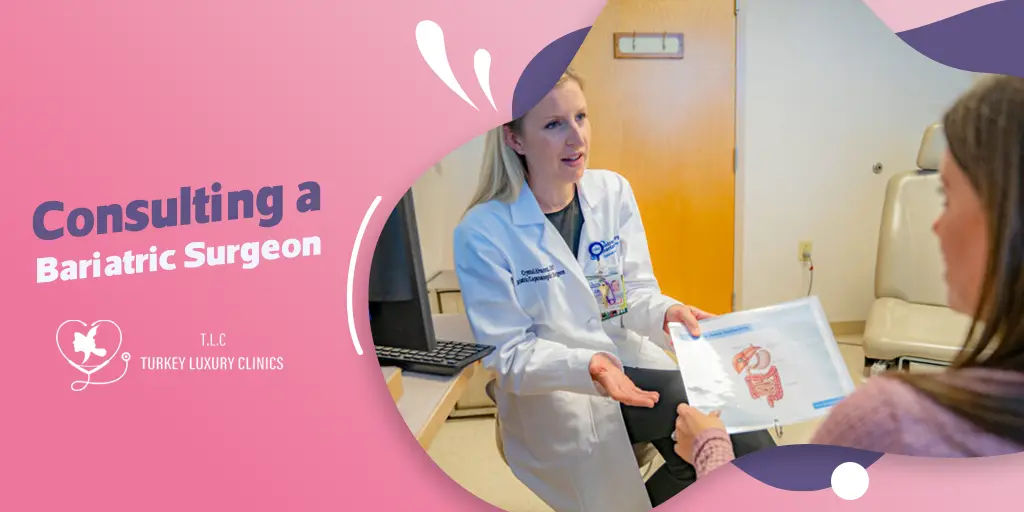- - Consulting a Bariatric Surgeon… Why is it Important ?
- - Key Components of Consulting a Bariatric Surgeon
- - Medical History Review
- - Physical Examination
- - Psychological Examination
- - Nutritional consultation
- - Lab Tests and Screenings
- - Discussion of Risks and complications
- - Explanation of the Procedure
- - General Recommendations
- - Consulting a Bariatric Surgeon at Turkey Luxury Clinics
- - Resources
Consulting a Bariatric surgeon goes through many steps which include physical examination - mental and psychological evaluation - nutritional consultation and discussing your fears and questions.
Consulting a bariatric surgeon is essential to guarantee a safe gastric sleeve surgery, let’s learn more about the consultation in the following article.
Consulting a Bariatric Surgeon… Why is it Important ?
It is essential to take your time during consulting a bariatric surgeon, it is the first step after all in your wellness journey to lose weight effectively, the consultation provides many benefits:
- Assess eligibility to undergo sleeve gastrectomy
- Discuss expectations and understand the whole journey to lose weight
- Identify any potential risks and discuss how to overcome them
- Develop a personal plan before and after the surgery
Key Components of Consulting a Bariatric Surgeon
What happens during the consultation? let's find out:
- Medical History Review
- Physical Examination
- Psychological Examination
- Nutritional consultation
- Lab Tests and Screenings
- Discussion of Risks and Complications
- 7. Explanation of the procedure
- General recommendations
Medical History Review
Of course! It is crucial to provide all the details about your medical history and that includes:
- Current medical condition and if you have any chronic diseases
- Medical record of any operations you’ve performed before
- Medical history of any previous sickness
- Family history of obesity or metabolic disorders
- Current medications, whether chronic or temporary
- Any allergies you have
- Life habits like smoking - alcohol consumption or drug use
- The overall diet and the quality of your meals
- Activity and workout
Physical Examination
This step is also essential to provide all the needed data that qualifies you for gastric sleeve surgery, and the physical examination usually consists of:
- Measurement of the BMI which should be over 40 or 35 - 40 with obesity-related diseases
- Signs of obesity-related diseases such as metabolic syndrome or liver diseases or heart disease
Psychological Examination
It is important to understand that sleeve gastrectomy or any bariatric surgery is not the destination but a step towards healing, and this journey includes changing your lifestyle habits so the mental health professional will evaluate:
- Your ability to commit to the postoperative instructions
- The readiness to change your diet and meals and eating habits
- History of any eating disorders like emotional eating
- History of any mental disorders like anxiety and depression
- Your support system including friends and family
Nutritional consultation
How can you lose weight without fixing your eating habits? It is not just about cutting off the stomach as you should change the way you eat or else you’ll lose your results soon after the surgery, and therefore you’ll learn:
- Dietary changes before and after the surgery
- How to fill your plat with essential nutrients like protein and vitamins
- Meal planning strategies during your road of weight loss
- What to eat and what to avoid
- Food that causes complications like high-fats and sugary foods
Lab Tests and Screenings
The doctor usually asks for lab tests and screenings to make sure your body is ready for the surgery and its possible complications and these tests usually include:
- Blood tests to check for anemia - calcium and Vitamins levels like D - B12 …etc
- Blood tests to check for cholesterol - sugar - LDL - HDL - Liver Enzymes …etc
- Electrocardiogram (ECG) to assess the heart condition
- Sleep study to check for sleep apnea
- Endoscopy if needed to check for any gastrointestinal abnormalities
- Additional consultations for any possible diseases like endocrine disorders
Discussion of Risks and complications
Surgeries can be an overwhelming situation for many people, so it is important to discuss your fears and questions with surgeon and get the answers you questions regarding any possible risks which include:
- Infection
- Bleeding
- Nutrient deficiency
- Acid Reflux
Explanation of the Procedure
What happens during the operation? Consulting a bariatric surgeon about the steps gives you an overall understanding about each step, the surgeon usually discuss these steps with you:
- .Anesthesia options
- The minimally- invasive approach
- The removal of the stomach
- The shape of the remaining stomach
- The size of the incisions which will be tiny
- The used technology and tools
- The expected duration of the surgery
- The expected hospital stay
General Recommendations
These recommendations are essential to follow to make sure your surgery goes well without any complications and they include:
- Avoid Smoking and Alcohol consumption
- Start exercising to shift into an active state before surgery
- Make medication adjustments like blood thinners “Aspirin”
- Have realistic expectations about the recovery phase
- Drink plenty amounts of water
- Wear comfortable clothes and avoid wearing jewelry or cosmetics
- Stop eating and drinking 8 hours before the surgery
Consulting a Bariatric Surgeon at Turkey Luxury Clinics
Are you searching for a credible and trusted surgeon to help you ease your concerns? Don’t worry because Turkey Luxury Clinics are your destination for Credibility and Safety!
Ask our doctors all the questions you want and get a proper consultation with our medical team including Dr.Gokman Ozturk and Dr.Hakan Seyit, Get your appointment now!
The right choice of a better life is a phone call away! Consult our bariatric surgeons and let’s discuss your dream results today! Get a free online appointment now










